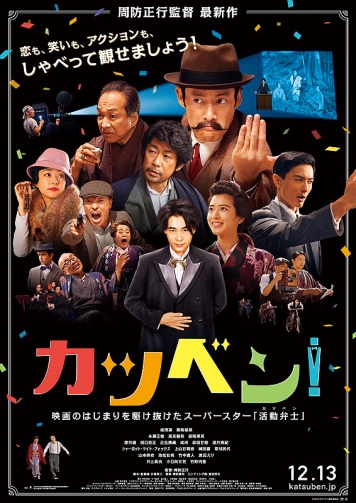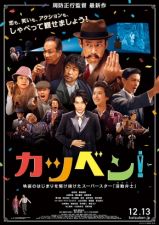A silent film narrator finds his voice, but can he get the girl?
Sneak Preview Screening: "Talking the Pictures (Katsuben!)" followed by a Q&A with
director Masayuki Suo and star Ryo Narita
Monday, December 2 at 6:45 pm*

*Please note early start time
In Japanese with English subtitles
Japan, 2019 127 minutes
Written and directed by: Masayuki Suo
Produced by: Kazuhito Amano and Takao Tsuchimoto
Starring: Ryo Narita, Yuina Kuroshima, Masatoshi Nagase, Kengo Kora, Mao Inoue,
Takuma Otoo, Naoto Takenaka, Eri Watanabe, Fumiyo Kohinata, Yutaka Takenouchi
Film courtesy of Toei
From its opening frames, as children and weather disrupt the filming of a silent swashbuckler, to the hilarious bicycle chase in its final reel, "Talking the Pictures" exuberantly proclaims its love for the movies. Endlessly inventive, quirkily evocative, chockfull of clever period detail and driven by a jaunty ragtime score, it is guaranteed to be the most fun you've had at a theater in many moons, whether you're young, old or in between.
And if you've not had the pleasure of watching a live katsudo benshi narrator, "Talking the Pictures" is the next best thing. Smartly written by Masayuki Suo, the director of such indelible works as "Shall We Dance?" (1996), "I Just Didn't Do It" (2007) and "Lady Maiko (2014)," the story is set in the era, a century ago, when black-and-white, silent pictures were always accompanied by a katsuben performer, many of whom became bigger stars than the actors on screen.
Shuntaro Someya (Narita in a breakout role) has dreamed of being a katsuben since childhood, but then he grows "as tall as a telephone pole" and falls in with a group of thieves who do their work while he poses as a phony narrator. By chance, Shuntaro escapes with a bundle of money and finds work at the small-town Aoki-kan, where audiences (and staff) have dwindled since the opening of a fancier rival theater nearby. It's just the kind of place where he'll be safe from the head of the thieves (Otoo), who wants his cash back, and a police detective (Takenouchi) who wants to punish the phony narrator for the "dishonor he's brought to motion pictures."
But when he gets his big break on stage one night, his pursuers discover his whereabouts. And then there's the girl, Shuntaro's childhood crush, Umeko (Kuroshima). The aspiring actress is in the Aoki-kan that night, recognizes the flourishes of his performance, and rushes to his rescue. But when (real-life film director) Buntaro Futagawa hires her for a role that will take her away to Kyoto, Umeko has to choose between a career and Shuntaro.
Team Suo favorites Naoto Takenaka and Eri Watanabe are slide-splitting as the owners of the ailing Aoki-kan, which is populated with some of the most uniquely endearing characters seen on Japanese screens since Suo's 1996 hit. Masatoshi Nagase is the theater's drunken former katsuben star, self-styled as the Poet of the Dark; Kengo Kora is the oily new star, too big for his own silk breeches; Fumiyo Kohinata is the unscrupulous owner of the rival theater and Mao Inoue is his seductive secret weapon for putting Aoki-kan out of business; and Koji Yamamoto is Shozo Makino, another real-life director who is considered the father of Japanese film.
These and many other nostalgia-tinged delights await viewers of "Talking the Pictures." Please join us for this sneak peak just before its Japan release on December 13.
For more (in Japanese): http://www.katsuben.jp
MASAYUKI SUO directed his first mainstream movie, "Fancy Dance" in 1989, and followed up with "Sumo Do, Sumo Don't" (1992), again featuring Masahiro Motoki as the lead, and winning such awards as Best Film at the Japan Academy Prizes. In 1993, Suo co-established production company Altamira Pictures, and in 1996 made "Shall We Dance?", which swept 13 categories at the Japan Academy Prizes, was released globally and inspired a Hollywood remake in 2005. He again dominated domestic awards with "I Just Didn't Do It" (2007). Other films include "Dancing Chaplin" (2011), a documentary based on a Roland Petit ballet, "A Terminal Trust" (2012) and "Lady Maiko" (2014). In 2016, Suo was presented with a Medal of Honor with Purple Ribbon for his contributions to the film industry.
Actor RYO NARITA started his career as a model, and made his TV acting debut just 4 years ago, in 2015. His screen debut came in 2016, with Yoshihiro Nakamura's "The Inerasable." He has since appeared in "Kiseki: Sobito of That Day" (2017), "Code Blue the Movie" (2018), "Stolen Identity" (2018), "Smokin' on the Moon" (2018), "Fly Me to the Saitama" (2019), "Just Only Love" (2019), "Farewell Song" (2019), and "No Longer Human" (2019). He received the Newcomer of the Year Award at the Japan Academy Prizes earlier this year.
Please make your reservations at the FCCJ Reception Desk (3211-3161) or register below. You may attend the Q&A session without attending the screening, but you will not have seating priority. All film screenings are private, noncommercial events primarily for FCCJ members and their guests.
- Karen Severns, Film Committee


